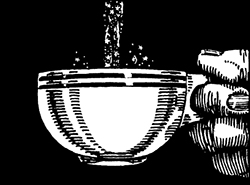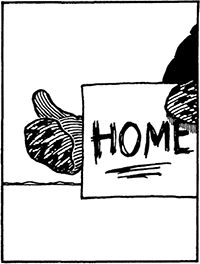
If my words did glow
with the gold of sunshine
And my tunes were played
on the harp unstrung1
Would you hear my voice
come through the music
would you hold it near
as it were your own?
It’s a hand-me-down
The thoughts are broken
Perhaps they’re better
left unsung
I don’t know
Don’t really care
Let there be songs
to fill the air
Chorus:
Ripple in still water
when there is no pebble tossed
nor wind to blow
Reach out your hand
if your cup be empty2
If your cup is full
may it be again
Let it be known
there is a fountain3
that was not made
by the hands of men4
no simple highway
between the dawn
and the dark of night
And if you go
no one may follow
That path is for
your steps alone5
Ripple in still water
when there is no pebble tossed
nor wind to blow
You who choose
to lead must follow6
but if you fall
you fall alone
If you should stand
then who’s to guide you?
If I knew the way
I would take you home7
Words by Robert Hunter
Music by Jerry Garcia
The line also recalls William Butler Yeats’s “The Madness of King Goll,” in which the king speaks of a “harp all songless” that he has found:

When my hand passed from wire to wire
It quenched, with a sound like falling dew
The whirling and the wandering fire
But lift a mournful ulalu
For the kind wires are torn and still
And I must wander wood and hill
Through summer’s heat and winter’s cold
They will not hush
King Goll was an Irish king of legend, having lived in the third century. Oddly, this is also the time when King Cole (close assonance) of Britain was supposed to have reigned. See the note under “Alligator” regarding Old King Cole.
Edward Gorey wrote a novel titled The Unstrung Harp: Or, Mr. Earbrass Writes a Novel (1953). A description by the publisher:
“On November 18th of alternate years Mr. Earbrass begins writing ‘his new novel.’ Weeks ago he chose its title at random from a list of them he keeps in a little green notebook. It being teatime of the 17th, he is alarmed not to have thought of a plot to which The Unstrung Harp might apply, but his mind will keep reverting to the last biscuit on the plate.”
So begins what the Times Literary Supplement called “a small masterpiece.” The Unstrung Harp is a look at the literary life and its “attendant woes: isolation, writer’s block, professional jealousy, and plain boredom.” But as with all of Edward Gorey’s books, The Unstrung Harp is also about life in general, with its anguish, turnips, conjunctions, illness, defeat, string, parties, no parties, urns, desuetude, disaffection, claws, loss, Trebizond, napkins, shame, stones, distance, fever, antipodes, mush, glaciers, incoherence, labels, miasma, amputation, tides, deceit, mourning, elsewards. You get the point. Finally, The Unstrung Harp is about Edward Gorey the writer, about Edward Gorey writing The Unstrung Harp. It’s a cracked mirror of a book, and it’s dedicated to RDP, or Real Dear Person.
Additionally, I have always wondered about an episode in Chris Van Allsburg’s wonderful The Mysteries of Harris Burdick, titled “The Harp.” (This book is a collection of drawings, with a title and first line for each, presented as a source of inspiration for children to write their own stories to go with the drawings.) The first line given is “So it’s true, he thought, it’s really true.” And the drawing shows a boy peering at a stream-fed pond, beside which sits a harp; and there is an expanding set of ripples beside the harp.
Several lines in this lyric conjure up the Twenty-third Psalm, which for many listeners will be an evocation of peace and reassurance. In particular, the lines referring to “still water,” the filling of an empty cup, and the walking on a path in the shadow of the dark of night are strong references.

Hunter invokes the psalm’s associations in the first verse, with his mention of the traditional psalmist’s accompaniment, the harp.
TWENTY-THIRD PSALM:
The Lord is my shepherd, I shall not want
He maketh me to lie down in green pastures
He leadeth me beside the still waters
He restoreth my soul
He leadeth me in the paths of righteousness for his name’s sake
Yea, though I walk through the valley of the shadow of death
I will fear no evil, for thou art with me
Thy rod and thy staff they comfort me
Thou preparest a table before me in the presence of mine enemies
Thou annointest my head with oil, my cup runneth over
Surely goodness and mercy shall follow me all the days of my life
And I will dwell in the house of the Lord forever
In some ways, the song could be viewed as an updating, or a humanizing, of the psalm. The Interpreter’s Bible states that:
psalms are also notable as being the literary record of a reproducible religious experience. . . . Later generations can . . . stand, as it were, on their shoulders; they can think their thoughts after them and catch some of their faith and vision.
This is a remarkable passage in that it can be seen to shed direct light on Hunter’s line “It’s a hand-me-down, the thoughts are broken.” The poet has a psalmist’s duty to hand down his version of the religious experience through his poetry. In this case, the psalmist admits, and even celebrates, his humanity: “If I knew the way, I would take you home.” If I knew.
The Twenty-third Psalm plays a role in two other Hunter lyrics: “Alabama Getaway” and the unrecorded song from the Eagle Mall Suite, “John Silver,” both of which mention “the valley of the shadow.”
Hunter’s choice of a pool of water being momentarily disturbed by a ripple is in accordance with Samuel Taylor Coleridge’s imagery in describing the fleetingness of the altered state in “Kubla Khan”:
Then all the charm
Is broken—all that phantom-world so fair
Vanishes, and a thousand circlets spread,
And each mis-shape the other. Stay awhile,
Poor youth! who scarcely dar’st lift up thine eyes—
The stream will soon renew its smoothness, soon
The visions will return! And lo, he stays,
And soon the fragments dim of lovely forms
Come trembling back, unite, and now once more
The pool becomes a mirror.
For more on Taylor and “Kubla Khan,” see the annotations for “What’s Become of the Baby?”
Cirlot, in A Dictionary of Symbols:
Fountain (or Source). In the image of the terrestrial Paradise, four rivers are shown emerging from the centre, that is, from the foot of the Tree of Life itself, to branch out in the four directions of the Cardinal Points. They well up, in other words, from a common source, which therefore becomes symbolic of the “Centre” and of the “Origin” in action. Tradition has it that this fount is the fons juventutis whose waters can be equated with the “draught of immortality”— amrita in Hindu mythology. Hence it is said that water gushing forth is a symbol of the life-force of Man and of all things. For this reason, artistic iconography very frequently uses the motif of the mystic fount. 40
The Merle Travis song “I Am a Pilgrim” has these lines:
There is a home in that yonder city
That was not made by hand.
Walt Whitman’s “Song of Myself”:
Not I—not anyone else, can travel that road for you,
You must travel it for yourself.
Friedrich Nietzsche’s 1881 preface to Daybreak:
For he who proceeds on his own path in this fashion encounters no one: This is inherent in “proceeding on one’s own path.” No one comes along to help him: all the perils, accidents, malice, and bad weather which assail him he has to tackle by himself. For his path is his alone.
The folk song “Lonesome Valley”:
You got to walk that lonesome valley
You got to walk it by yourself;
There’s no one here can walk it for you
You got to walk it for yourself.
From the Tao te Ching:
Therefore, desiring to rule over the people,
One must in one’s words humble oneself before them
And, desiring to lead the people,
One must, in one’s person, follow behind them.
Mark 10:444:
“and whosoever would be first among you must be slave of all.”
This line presages the Barlow-Mydland song “I Will Take You Home.”

Lyric written in London, 1970.
Studio recording: American Beauty (November 1970).
First performed on August 18, 1970, at the Fillmore West in San Francisco. It never found a permanent place in the Dead’s live repertoire, but was played on special occasions such as the 1980s fifteenth-anniversary shows in San Francisco and New York, both of which included acoustic sets.
See Keith Abbott’s Downstream from Trout Fishing in America (Santa Barbara: Capra Press, 1989). In this memoir, Abbott recalls a dinner party at Richard Brautigan’s Bolinas, California, residence in the early 1970s, at which the poet Robert Creeley was a guest.
Just before dinner was served, Richard made a big show of putting on a Grateful Dead record. He said that he had been saving the record as a surprise for Creeley. Bob nodded his thanks. When the first cut started Creeley brought his head up abruptly. “This is my favorite cut on that record,” he announced. Richard beamed happily. As Creeley listened to the song Richard told a story of all the obstacles that he had encountered during the day in his attempt to find this particular record for Bob. Content that he had made Creeley happy, Richard went back to the kitchen to attend to dinner. When the song was over, Creeley got up, went over to the stereo, and, trying to play the cut again, raked the needle across the record, ruining it. “Uh-oh,” he said. Then he went back to the couch and resumed his discussion. At the sound of the record’s being ruined, Richard came rushing out of the kitchen and stood there, watching the whole ‘uh-oh’ performance by Creeley. Going over to the stereo he brought out a second copy of the album from the stack alongside it. In his own funny, precise way, Richard congratulated himself. “I’m ready for Bob this time,” he boasted. Then he went on to relate how Creeley had wrecked the very same album on a previous visit. 41
Asked via email in 2002 about which song was the “favorite cut” on that record, Creeley replied:
That was one drunken evening, like they say—of probably all too many. Richard knew my failings, call them, and so had backed up the record he expected me witlessly to scratch with another, which I seem then to have x’d as well. Ah eagerness—and drink. We were neighbors at that time in Bolinas, with him just down the road from us headed into town.
Anyhow the terrific song, as I remember at least, is Robert Hunter’s “Ripple” and one of my prized possessions is Robert Hunter’s collected lyrics, A Box of Rain, which he generously sent me some years after. Anyhow I love that echoing “Ripple in still water. . . .”
Best to you,
Robert Creeley